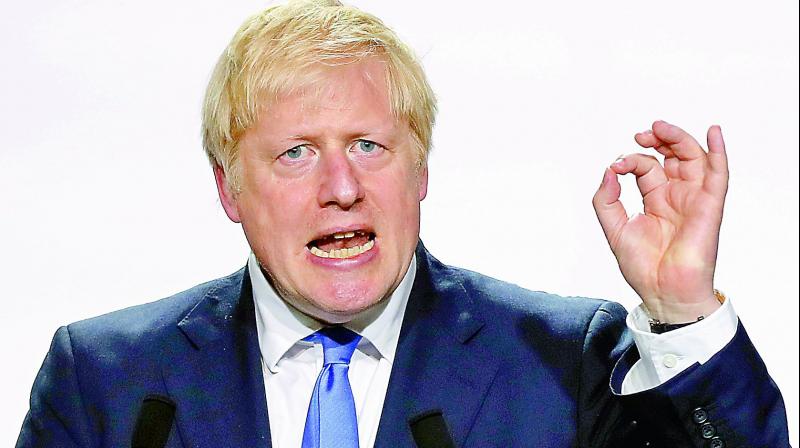Will PM Boris be forced to resign next week?
No Prime Minister can continue in office after deliberately misleading the Queen.

If last week, after the British Parliament prevented Boris Johnson taking the United Kingdom out of the European Union without a deal and twice refused his request for an early election, the British Prime Minister had consoled himself with the thought that things can’t get worse, he now knows how premature was that assumption. He ends this week with a marked deterioration in his fortunes and next week could even see the crisis in his prime ministership culminating in his resignation. There seems no end to his bad luck. No wonder the British are calling their hapless Prime Minister benighted Boris.
This week’s crisis is a consequence of a landmark verdict by the Scottish high court — more correctly known as the Inner House of the Court of Session — declaring Mr Johnson’s advice to Queen Elizabeth II to prorogue Parliament “unlawful” and, on that basis, determining that “the prorogation which followed thereon was unlawful and is thus null and of no effect”. It was a unanimous decision by the three judges of the court. They argued that the Prime Minister’s real purpose was to “stymie Parliament” and in claiming otherwise to the Queen he misled her. In other words, he lied.
Lord Brodie, one of the three judges, could not have been clearer when he said: “This was an egregious case of a clear failure to comply with the generally accepted standards of behaviour of public authorities. It was to be inferred that the principal reasons for the prorogation were to prevent or impede Parliament holding the executive to account and legislating with regard to Brexit, and to allow the executive to pursue a policy of a no-deal Brexit without further parliamentary interference.”
This would be a dire outcome for any Prime Minister, but particularly for Mr Johnson, who’s short bumbling prime ministership has become an object of ridicule. It’s hard to recall another instance in the last 100 years when a Prime Minister’s advice to the sovereign was declared unlawful.
So, as things stand this weekend, Mr Johnson’s prorogation is unlawful and Parliament must be reconvened, although the Scottish court did not specifically order that. Mr Johnson’s only hope now is the British Supreme Court, which will hear an appeal on Tuesday, and might overturn the verdict from Scotland. If it does not do so, he will be required to resign. No Prime Minister can continue in office after deliberately misleading the Queen.
The key issue will be determining whether a Prime Minister’s advice to prorogue Parliament is a political issue, which is not justiciable, or a matter that the courts can legitimately look into. Earlier, the high court in London had ruled that the advice given by the Prime Minister to the sovereign to suspend Parliament was a political matter, and not one for the courts. It argued that there are no legal standards against which to judge it. The Scottish court took the opposite view. It ruled that the Prime Minister’s advice to prorogue could be reviewed, not on ordinary judicial grounds of review but on fundamental constitutional principles. Parliament’s role scrutinising the government, which it called a central pillar of the British constitution, is one such principle. Therefore, any advice motivated by an intention to stymie Parliament is unlawful.
In going into this issue, the Supreme Court will also have to address three, possibly four, other concerns. First, it will have to resolve the fact that Scottish law and English law differ. It won’t be simple or easy to uphold one and dismiss the other. Indeed, it’s even possible that the Supreme Court might conclude both the high court decision in London, deeming prorogation lawful, and the Scottish ruling, holding it unlawful, are correct. The first could be right in English law and the second in terms of Scottish law. In which case, according to professors of law speaking on the BBC, the Supreme Court would pronounce prorogation unlawful and strike it down.
The other three concerns are more arcane and, therefore, more awkward. They touch upon tricky constitutional issues which British courts have usually skilfully avoided. This time they might have to be confronted.
First, what are the powers of Parliament versus those of the judiciary? Second, where does the jurisdiction of the legislature end and that of the executive start? Indeed, it’s even conceivable questions could be raised about the constitutional role of the Queen. As the BBC website puts it: “Should the Palace have pushed Downing Street harder as to the reasons for the prorogation? The Queen has been drawn into the Brexit mire and the questions now go to the heart of her constitutional role”. These issues may be easy to state yet fiendishly difficult to resolve because Britain doesn’t have a written constitution but, instead, relies on convention and precedent.
A bench of nine judges (out of a total strength of 12 in the Supreme Court) will hear this case. It’s quite possible that they will split over their decision. But even if he loses by a majority of one, Mr Johnson will have been politically defeated, discredited and effectively forced out of office. As Britain’s former attorney-general, Dominic Grieve, said, he would have to resign “pretty swiftly”.
This means the weekend that begins on Saturday is no holiday for Mr Johnson. If his opponents had been at the centre of this crisis it would have brought forth flourishes of his renowned rococo rhetoric. But now, as the man around whom the storm rages, he is unaccustomedly silent.
The writer is a television commentator and anchor

